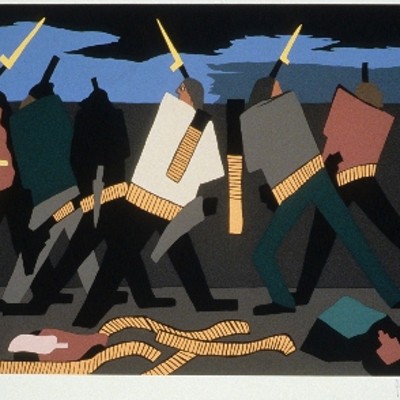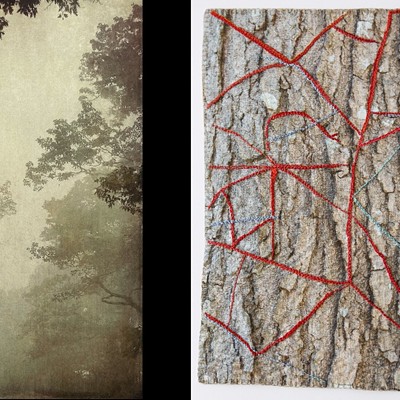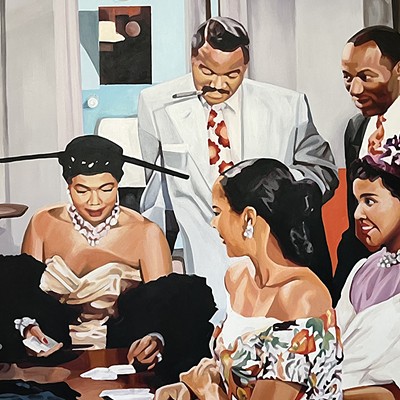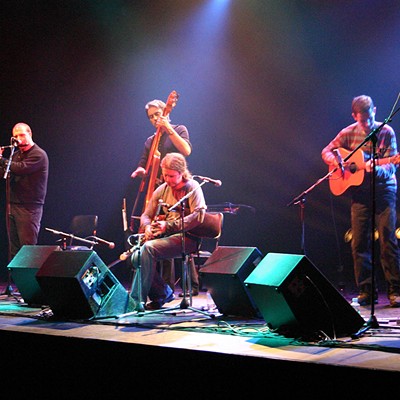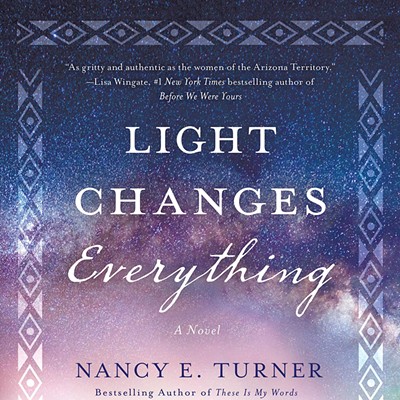"I kept reading these awful distortions," says the Tucson author. The daughter of a Jordanian father and an American mother, Halaby is married to a Palestinian. "I had a whole book written filled with normal Arab people I felt I had a responsibility to do something with."
That manuscript, West of the Jordan, became Halaby's first published book. A coming-of-age tale of four girl cousins from an imaginary Palestinian village not unlike Halaby's husband's, the book had originally been rejected by numerous publishers. But after 9/11, Halaby tried again, and found a publisher in Beacon Press, a venerable New England institution.
"It was a fluke and I feel blessed," says Halaby over a cup of coffee at Bentley's, on the first snow day in years. "They published Mark Twain! Capitalizing on 9/11 is gross, but there was no balance. This book had real people to relate to, not media creations."
Published in 2003, the apolitical book was well received, even picking up the PEN/Beyond Margins Award given to works by "authors of color." But when Halaby started her next novel, the brand-new Once in a Promised Land, she was living in the post-9/11 world. She felt she had no choice but to address it.
"This was a book I would not have written under a different political climate," she says. "What was exploding around the world entered into the tone of it."
Also published by Beacon, the novel tells the story of the Haddads, a well-heeled couple living in Tucson's Foothills. Jassim is a single-minded hydrologist, a Jordanian who got his Ph.D. at the UA and stayed on to expose desert dwellers to the virtues of conservation and rainwater-harvesting. Salwa, his restless younger wife, is also from Jordan, the daughter of displaced Palestinians. Initially attracted to Jassim's passion for science, nine years into the marriage she's having trouble figuring out her own life, trying out banking and real estate, and surreptitiously trying to get pregnant. Weekends, she devotes much of her free time to shopping.
"They're just a couple whose marriage is falling apart," Halaby says.
But their personal misfortunes are compounded by the fallout from 9/11. The novel opens on the morning of Sept. 11, and with the nation (and Tucsonans) terrified of more bombings, it's not long before the couple fall under suspicion. Neither is political or religious, but Salwa has routinely wired money back home, and Jassim has long had access to the city's water supply. Even the lies they've told each other in their marriage begin to count against them.
Writing with a sense of creeping horror, Halaby depicts the Haddads' ordinary activities coming under scrutiny by citizens galvanized by President Bush's call to act as the eyes and ears of the government. It's not long before their comfortable life in the Promised Land is threatened.
Some of the characters who rat them out are obvious bad guys--including a racist ex-military guy by the name of Jack Franks--but Halaby also shows the effects of paranoia on good people. A level-headed hydrologist who heartily admires Jassim eventually succumbs to the whisper campaign.
"Even people who 'get it' fall into the trap," Halaby says.
Tucson's a fairly liberal city, she says, and most of her own family's experiences here after 9/11 were positive.
"We were in a supportive community," she says, and her two sons "were in a school that cherished their Arab identity." Yet people stared at her Middle Eastern husband, and she herself ran into a problem at work related to her "ethnic identity" that "gave me a sense of what it's like to be judged."
Halaby was born in Lebanon, but moved to Tucson with her mother at the age of 5. Her father remained in the Middle East, and Halaby visited frequently as a teen, keeping "a foot here, a foot there. I felt different in both places."
After graduating from Tucson's University High School, Halaby studied Italian literature at Washington University in St. Louis, and picked up a master's in Arabic literature at UCLA. She also won a Fulbright to research folklore in Jordan. Her year there yielded her first manuscript, a collection of Arabic folktales, as yet unpublished, but the structure of the tales also helped shape the new novel. Once in a Promised Land recounts several stories outright.
Arabic phrases are sprinkled throughout the book, which also has some scenes in Jordan, but "I speak Arabic like a grandmother," Halaby jokes, "not the language of an educated city person."
To help support her writing habit, Halaby earned a second master's, in counseling. During the two-and-a-half years she spent writing Once in a Promised Land, she managed to take a year off from her current day job counseling smokers who are trying to quit. She wrote in the early morning hours, she says, and like her character Jassim, who swims at daybreak, she came to relish the quiet when everyone else is sleeping.
"I'd get up at 4 and work until 6," she says.
The book has already gotten a nod from Barnes & Noble, which named it a "Discover Great New Writers" selection. The writer Andre Dubus III, author of House of Sand and Fog, gave it an enthusiastic blurb, calling it a "deeply resonant tale of our tangled and common humanity."
With the book out, Halaby is back working part-time, picking up the kids after school ("they're both in soccer"), doing "house stuff and homework stuff," running for exercise, writing poetry and kids' stories and managing to start novel No. 3.
"It's not that far along. I start with the people and it all comes from that."
She and her husband moved back to Tucson after their second son, now 7, was born, to enlist her mother's help in raising the boys. Moving to the West Bank, her husband's home, is not really an option, she says, given the restrictions placed on Palestinians by the Israeli government. Her mother-in-law is not permitted to visit Jerusalem, she says, and last summer on a visit home, the family was detained by armed soldiers near the airport.
"There's so much entrenched anger on either side," she sighs. "I wish I had an answer. But allowing open dialogue--and respecting that other cultures are as valid as yours--is the basic premise."

